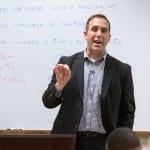Author Archive
Favorite Books of 2017
 Stories awaken. Research informs. Drama shapes. Arguments challenge. Heroic escapes. These are some of the reasons why I read books. 2017 was a record year: 58 books read, for a total of 361, since I started keeping a book log on June 1, 2009. For each book read I record the date completed, title, author, and a one sentence summary. As is now tradition, in this blog post I list my favorites of the year in philosophy, apologetics, fiction, non-fiction, and devotional reading:
Stories awaken. Research informs. Drama shapes. Arguments challenge. Heroic escapes. These are some of the reasons why I read books. 2017 was a record year: 58 books read, for a total of 361, since I started keeping a book log on June 1, 2009. For each book read I record the date completed, title, author, and a one sentence summary. As is now tradition, in this blog post I list my favorites of the year in philosophy, apologetics, fiction, non-fiction, and devotional reading:
The Home I Haven’t Found
 [Guest Post by Lucas Shipman:]
[Guest Post by Lucas Shipman:]
I recently co-wrote a spoken word poem with Paul Gould. There is a line in this poem that says,
“I feel like there’s a home I haven’t found. My heart aches for something deeper, more profound.”
My Favorite Books from 2016
 Stories awaken. They draw me into another world. They help me see reality through another’s eyes. As C. S. Lewis aptly put it, “in reading great literature I become a thousand men and yet remain myself. Like the night sky in the Greek poem, I see with a myriad eyes, but it is still I who see.”[1] So, stories rattle me out of my slumber. They also teach me. I learn about space and time, hope and aspiration, human longing and evil, goodness and beauty, truth and hope. I learn—especially when reading philosophy or theology—how to think better as I pull the curtain back and peer into the depth of God or the world he has made. I am challenged to live a heroic life and to push away the temptation toward sloth. All of this, and more, from reading!
Stories awaken. They draw me into another world. They help me see reality through another’s eyes. As C. S. Lewis aptly put it, “in reading great literature I become a thousand men and yet remain myself. Like the night sky in the Greek poem, I see with a myriad eyes, but it is still I who see.”[1] So, stories rattle me out of my slumber. They also teach me. I learn about space and time, hope and aspiration, human longing and evil, goodness and beauty, truth and hope. I learn—especially when reading philosophy or theology—how to think better as I pull the curtain back and peer into the depth of God or the world he has made. I am challenged to live a heroic life and to push away the temptation toward sloth. All of this, and more, from reading!
Should We Love God and Nothing Else?
 Some Christians think we should love God and God alone. The idea is this. God is supreme. God is the ultimate object of all human longing. He is the only Being in all of reality that won’t let us down. We should therefore love God and shun all else. This line of thinking is deeply mistaken. It is also unbiblical. Nor can it be done; we cannot love God alone.
Some Christians think we should love God and God alone. The idea is this. God is supreme. God is the ultimate object of all human longing. He is the only Being in all of reality that won’t let us down. We should therefore love God and shun all else. This line of thinking is deeply mistaken. It is also unbiblical. Nor can it be done; we cannot love God alone.
Discovering the Truth: Cold-Case Christianity for Kids
 A modern myth is that learning and fun are incompatible. Learning is boring, drab, and dull. Entertainment is exciting, stimulating, and captivating. Never—or almost never—the two shall meet, or so the common myth goes. Sadly, this incompatibility between learning and fun is often perpetuated within the church.
A modern myth is that learning and fun are incompatible. Learning is boring, drab, and dull. Entertainment is exciting, stimulating, and captivating. Never—or almost never—the two shall meet, or so the common myth goes. Sadly, this incompatibility between learning and fun is often perpetuated within the church.
The Great Barbarism of our Day
 In a world bereft of objective value, nothing is good in itself. People and things are judged valuable only if they are deemed beneficial for something else. The only “real” value is economic. As a result we’re witnessing the systematic degradation of everything. Nothing is sacred. Nothing is good per se.
In a world bereft of objective value, nothing is good in itself. People and things are judged valuable only if they are deemed beneficial for something else. The only “real” value is economic. As a result we’re witnessing the systematic degradation of everything. Nothing is sacred. Nothing is good per se.
Will Heaven Be Boring? Near Death Experiences and our Imagination
 Belief in the afterlife is a staple feature of all cultures throughout human history. Just what the afterlife will be like is a question of considerable debate. In the Christian tradition, heaven is said to be the deepest longing of the human heart; hell the consequence of a life of self-love and sin.
Belief in the afterlife is a staple feature of all cultures throughout human history. Just what the afterlife will be like is a question of considerable debate. In the Christian tradition, heaven is said to be the deepest longing of the human heart; hell the consequence of a life of self-love and sin.
C. S. Lewis on the Practical Value of Friendship
 A mark of the digital age is a dearth of genuine friendship. Relationships today are largely mediated through pixels and measured by the length of a Snapchap streak or the number of Facebook “likes” received. The plague of superficiality spreads as we forget how to look others in the eye, carry on a conversation, and simply be together. The end result is an epidemic of loneliness.
A mark of the digital age is a dearth of genuine friendship. Relationships today are largely mediated through pixels and measured by the length of a Snapchap streak or the number of Facebook “likes” received. The plague of superficiality spreads as we forget how to look others in the eye, carry on a conversation, and simply be together. The end result is an epidemic of loneliness.
The Unforgivable Sin of Philosophy?
 A standard, albeit potted, way of characterizing the dominant modes of thought for ancient, modern, and postmodern intellectuals is in terms of the relationship between being and knowing. The concept of “being” has to do with metaphysics: what kinds of things exist and how do they relate? The concept of “knowing” has to do with epistemology: what can we know and how can we know it? For the ancient thinker, as the story goes, issues of being were primary and knowing secondary. In the modern era, this relationship was reversed: knowing determines being and not vice-versa. With the so-called postmodern era—an era I think has largely passed—neither being nor knowing are primary: rather our shared use of language determines what we can know, which in turn determines what there is.
A standard, albeit potted, way of characterizing the dominant modes of thought for ancient, modern, and postmodern intellectuals is in terms of the relationship between being and knowing. The concept of “being” has to do with metaphysics: what kinds of things exist and how do they relate? The concept of “knowing” has to do with epistemology: what can we know and how can we know it? For the ancient thinker, as the story goes, issues of being were primary and knowing secondary. In the modern era, this relationship was reversed: knowing determines being and not vice-versa. With the so-called postmodern era—an era I think has largely passed—neither being nor knowing are primary: rather our shared use of language determines what we can know, which in turn determines what there is.
In Defense of the Liberal Arts
 The purpose of the university, in the good old days, was to make fully functioning human beings. Alas today the purpose of the university is to created human doings, automaton who possess marketable skills—but are incapable of participating in a thoughtful conversation. The university, traditionally a place for the cultivation of intellectual and moral virtue, is today largely driven by market factors which place a priority on sports over academics, image over substance, and research—especially grant money research—over teaching. Only the fittest students and professors survive.
The purpose of the university, in the good old days, was to make fully functioning human beings. Alas today the purpose of the university is to created human doings, automaton who possess marketable skills—but are incapable of participating in a thoughtful conversation. The university, traditionally a place for the cultivation of intellectual and moral virtue, is today largely driven by market factors which place a priority on sports over academics, image over substance, and research—especially grant money research—over teaching. Only the fittest students and professors survive.
 Fueled by the conviction that stories sustain us because we were made to be nourished on the good, the true, and the beautiful, I determined to read one fiction book a month for this past year. And I read some very good stories! In addition to fiction, I have benefitted greatly this year from some solid works in philosophy, theology, biography, and spiritual formation. Without further ado, here are my favorite books read in 2023. As is custom, in my book log, I record the book title, author, and date completed, along with a one sentence description. This has been my practice since 2009. My book log now includes 635 entries. This year I read 43 books.
Fueled by the conviction that stories sustain us because we were made to be nourished on the good, the true, and the beautiful, I determined to read one fiction book a month for this past year. And I read some very good stories! In addition to fiction, I have benefitted greatly this year from some solid works in philosophy, theology, biography, and spiritual formation. Without further ado, here are my favorite books read in 2023. As is custom, in my book log, I record the book title, author, and date completed, along with a one sentence description. This has been my practice since 2009. My book log now includes 635 entries. This year I read 43 books. I love to read. Of course, being a professor helps. I get to read as part of my job. That’s good. But I also love to read for the sheer pleasure of it. When it comes to fiction, I love entering into secondary worlds and journeying along with the characters of the story. Often non-fiction reads like a good story too: life is life, story is story, and often the two kiss (a loose paraphrase of one of my favorite nonfiction stories of the year, All that is Sad is Untrue). (more…)
I love to read. Of course, being a professor helps. I get to read as part of my job. That’s good. But I also love to read for the sheer pleasure of it. When it comes to fiction, I love entering into secondary worlds and journeying along with the characters of the story. Often non-fiction reads like a good story too: life is life, story is story, and often the two kiss (a loose paraphrase of one of my favorite nonfiction stories of the year, All that is Sad is Untrue). (more…) I love to read. It’s partly why I’m an academic today. What could be better than reading, writing, teaching, and learning every day? Reading books awakens me: to truth, goodness, and beauty. I try, each year, to read broadly. This year, I managed to read 47 books. I’ve been recording every book read in a book log for over 10 years now. Whenever I finish a book, I list the date finished, the title, author, and a one sentence summary of the book. As has become my custom, I offer to you my favorite reads of the past year in philosophy, apologetics and theology, fiction, and non-fiction. (more…)
I love to read. It’s partly why I’m an academic today. What could be better than reading, writing, teaching, and learning every day? Reading books awakens me: to truth, goodness, and beauty. I try, each year, to read broadly. This year, I managed to read 47 books. I’ve been recording every book read in a book log for over 10 years now. Whenever I finish a book, I list the date finished, the title, author, and a one sentence summary of the book. As has become my custom, I offer to you my favorite reads of the past year in philosophy, apologetics and theology, fiction, and non-fiction. (more…)










